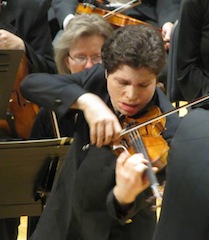
Hadelich, Premieres Liven Exceptional CSO Program

How do you encore Mendelssohn’s Violin Concerto?
Augustin Hadelich, guest artist with the Cincinnati Symphony Orchestra, did so with Niccolò Paganini’s Caprice No. 5 Friday evening at Music Hall.
And it, like the Mendelssohn, brought the house down. Hadelich’s Mendelssohn was expansive and warm-hearted, a rendition that reached out to everyone in the hall. His Paganini was a display of virtuosity that had to be seen and heard to be believed.
The concert, led by guest conductor Juanjo Mena, chief conductor of the BBC Philharmonic, was also exceptional for featuring two CSO premieres: Argentine composer Alberto Ginastera’s ballet music for “Panambí” (1937) and the Overture to French composer Gabriel Pierné’s incidental music for “Ramuntcho” (1908). The one is suffused in Basque folk melody. The other was composed for a ballet on an ancient Indian folk tale.
Pierné’s Overture made a perfect curtain-raiser, bright, tuneful and with a celebratory air. Its rhythmic vitality and touches of tambourine and castanets set the stage splendidly for what was to follow.
The first thing that struck one about Hadelich’s playing was his warm tone (he plays a 1723 Stradivarius). He also gave the Mendelssohn Concerto a more outgoing, optimistic aspect than one is accustomed to in darker, more introverted readings. The Andante slow movement was a study in beauty itself, soulful and singing. Hadelich launched the finale with a saucy flip of harmonics, preparing his listeners for an agile, light-hearted performance that brought them to their feet.
Rather than a song-like, “relaxing” encore, Hadelich gave them a stunning performance of the Paganini Caprice, one in which he covered every square centimeter of his instrument, bottom to top, at top speed. It simply took one’s breath away.
Ginastera’s “Panambí” has been called the Latin American “Rite of Spring,” and indeed it does show the influence of Stravinsky, both in concept and execution. It is the story of a pair of young lovers, the maiden Panambí and the warrior Guirahú, a Sorcerer with designs on Panambí and some water goddesses who (temporarily) carry Guirahú away. Scored for large orchestra – there were no less than eight percussionists onstage, plus principal timpanist Patrick Schleker – it is colorful, cathartic and calculated get one’s pulse racing.
The work opened with a wonderfully atmospheric “Moonlight on the Paraná” (a river in northeast Argentina) before breaking into a native festival, including a round dance for the girls and a raucous, brassy warriors’ dance, with drums pounding. After a quiet scene, came the love music, expressed most movingly by principal flutist Randy Bowman in “Guirahú s Song.”
Still, there is trouble afoot. The Sorcerer – contra-bassoonist Jennifer Monroe – approached and the water goddesses began their mischief, all to Technicolor orchestration by Ginastera and precise, informed conducting by Mena, leading to a big explosion. “The Tribe’s Restlessness” could have been a page out of Stravinsky’s “Rite,” with its brass, drums and heavy accents, while “Panambí’s Prayer” featured touching clarinet solos by acting principal clarinetist Jonathan Gunn. Ever lurking within this yearning music was contra-bassoonist Monroe as the Sorcerer.
“Invocation to the Powerful Spirits” brought the brass, drums (and Stravinsky) back into play, followed by “The Sorcerer’s Dance,” an infectious movement with insistent rhythms and trombone slides. “The Maiden’s Lament” played out on soft, gentle strings with flute and violin (concertmaster Timothy Lees) solos, followed by a huge outburst as the good gods appear and the Sorcerer’s plans are undone.
The work closed with “Dawn.” Here a warm viola melody, woodwind bird calls and rippling figures in the woodwinds recalled “Sunrise” from Maurice Ravel’s “Daphnis and Chloe,” complete to its shattering conclusion.
The concert repeats at 8 p.m. tonight at Music Hall. Tickets begin at $12. Call (513) 381-3300, or visit www.cincinnatisymphony.org